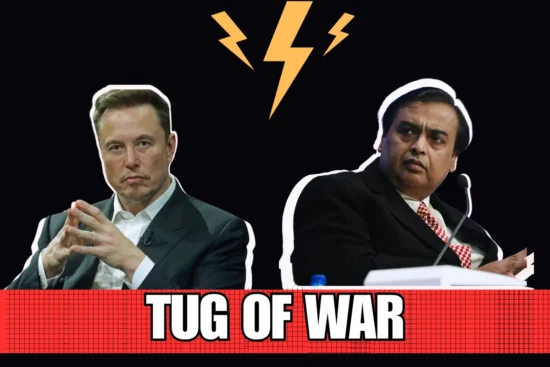Table of Contents
In the high-stakes world of satellite broadband, two of the world’s most prominent billionaires, Elon Musk and Mukesh Ambani, are facing off in India. Their battle is not just about technology but also about how millions of people access the internet. Let’s dive into what’s happening and why it matters.
The Players: Elon Musk and Mukesh Ambani
Eon Musk, the visionary CEO of SpaceX and Tesla, has been making headlines with his ambitious plans for Starlink, a satellite internet service. He aims to provide high-speed internet to underserved areas, especially in rural India, where connectivity has been a struggle.
On the other side, Mukesh Ambani leads Reliance Industries and has transformed telecommunications in India with Jio. His focus is on ensuring that local companies can compete fairly against foreign giants, like Musk’s Starlink.
The Spectrum Showdown
The heart of the conflict lies in the allocation of satellite spectrum. Recently, the Indian government decided to allocate this spectrum administratively instead of through an auction, a move that Musk welcomed. He believes this approach allows for more competition and innovation.
In contrast, Ambani and his team argue that auctions are essential to create a level playing field. They worry that without them, foreign companies could dominate the market, making it tough for local players to survive.
The Stakes for India
Why does this battle matter to everyday Indians? Well, the outcome could drastically change how millions access the internet. With India’s satellite broadband market projected to grow significantly, ensuring fair competition could lead to better services and lower prices.
Musk’s Starlink is poised to reach areas where traditional internet services don’t exist, bringing much-needed connectivity to rural communities. This could open up new educational and economic opportunities, improving lives across the country.
What’s Next?
Both Musk and Ambani are keenly watching how the regulatory landscape unfolds. Jio has already pushed for revisions in satellite communication guidelines, advocating for fair competition. Meanwhile, Musk’s Starlink has applied for licenses and is eager to enter the market.
The decisions made by India’s Telecom Regulatory Authority (TRAI) in the coming weeks will play a crucial role in shaping the future of satellite internet in the country. As the competition heats up, consumers could be the real winners with improved access and services.
A New Era of Connectivity
As we stand at this crossroads, it’s clear that the battle between Musk and Ambani is about more than just business. It’s about bridging the digital divide and ensuring that everyone has the chance to connect with the world.
With Musk’s innovative spirit and Ambani’s local expertise, this competition could lead to a brighter, more connected future for India. Whether you’re cheering for Musk or Ambani, one thing is certain: the race for satellite internet in India is just beginning, and the outcome will shape the way millions experience the digital age.
Hope you liked this coverage. Do check out World Story for more such stories from around the world.











